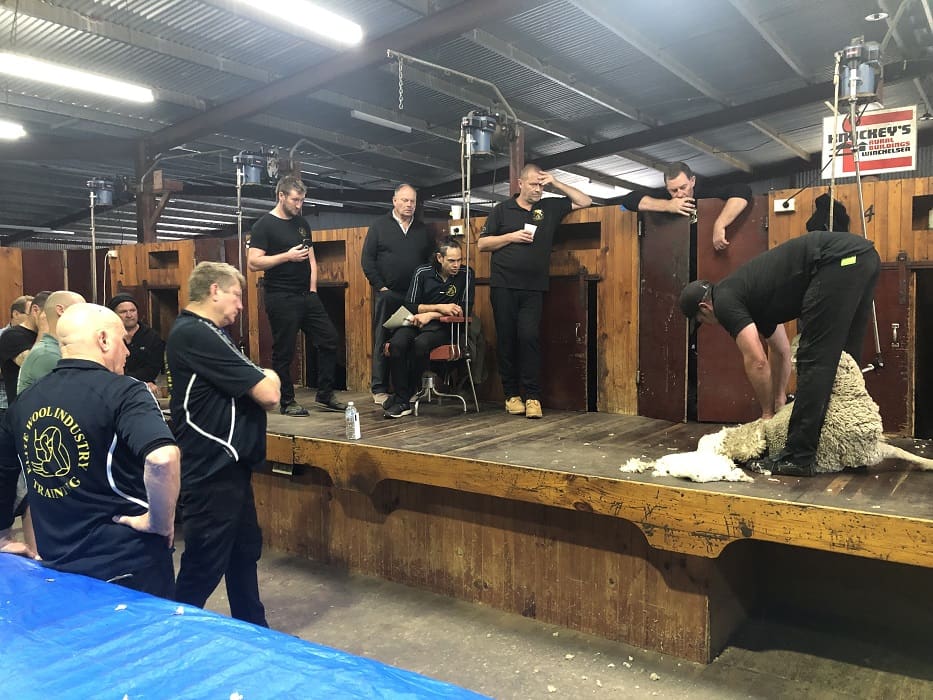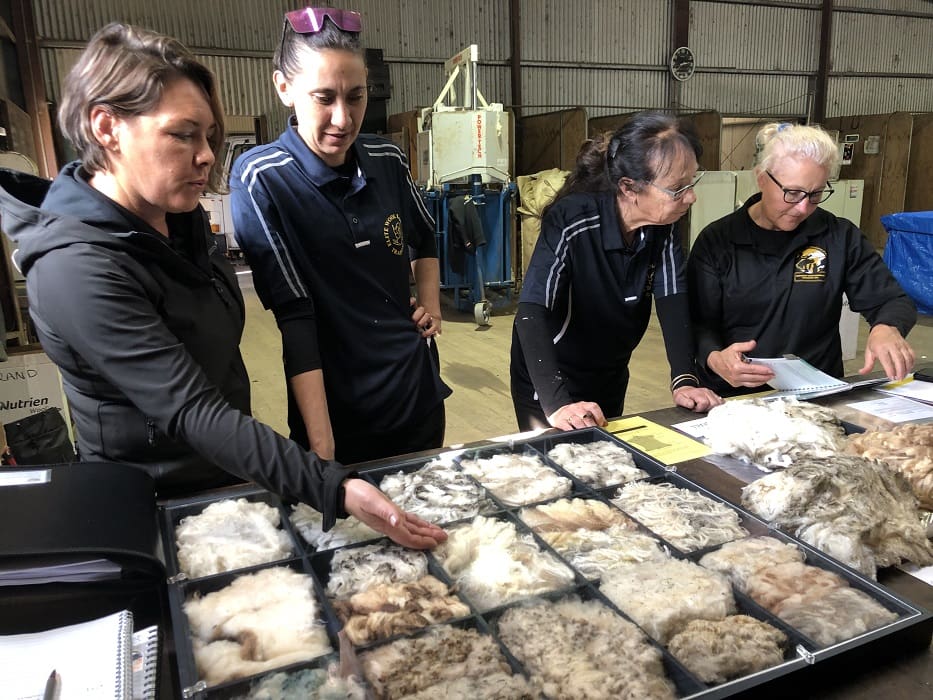
New Zealand and Australian shearer trainers compare notes as SCAA trainer Paul Oster shears at Wingeel.
TRANS-TASMAN shearer and wool handler trainer co-operation took an important step this week with the first train-the-trainer exchange workshop in Australia under a recently signed agreement between Australian and New Zealand training bodies.
Top shearer and wool handler trainers from both countries met at a Wingeel sheep property west of Melbourne to collaborate on shearing patterns and wool preparation standards, training methods and resources.
Australian Wool Innovation, along with Australia’s largest shearing and wool handling training organisation, SCAA Shearer Wool Handler Training Inc, last year signed a joint Memorandum of Understanding with New Zealand’s shearing training body, Elite Wool Industry Training NZ.
The MOU grew out of the need to collaborate on training methods and share resources to counter the global shortage of shearers and wool handlers and better equip workers and encourage them to work in both countries.
SCAA SWTI’s chief executive officer Glenn Haynes said the Wingeel workshop would improve the understanding and application of each country’s woolshed standards, training methods and terminology to improve shearing and wool preparation standards.
He said this involved introducing top NZ trainers and contractors to their counterparts in Australia and followed a similar workshop with AWI and SCAA SWHT trainers in New Zealand before the Golden Shears recently.
Om shearing styles, Mr Haynes said the Kiwis had “stolen bits and pieces off (world champion South Australian shearer) Shannon Warnest and we’ve stolen bits and pieces off (shearing royalty) David Fagan”.
“But now we are actually all sitting down together, and my thoughts are why just have one world champion when you can have two to work with, so we can get the best of both?”
“And the wool handlers the same, start swapping a few tips and techniques, so workers can have a soft landing…”
Better understanding by trainers and workers of each country’s shearing and wool handling methods and requirements for Merino and crossbred jobs “can literally save hours in the shed” and better trained staff can help ease the industry’s labour shortage, Mr Haynes said.
Sharing training methods and cooperation between New Zealand and Australian contractors to access better trained workers with the confidence to travel during peak seasons to work in Merinos and crossbred sheds, he said.
“A better trained and supported group of workers travelling between the two countries will make it easier to attract new people into the industry too.”
Waimate contractor Warren White said he shore in Australia in the 1980s before today’s shearing training existed, but he said the MOU would be “a big leap forward”.
AWI’s national wool training manager Craig French said after the trainers’ workshop in New Zealand it is good to have an exchange of wool harvesting staff between the two countries. He said the three NZ contractors at the Wingeel workshop said they had extreme labour demand pressures at certain times of the year.
“We are having the same issues, so the good thing is we can exchange staff when we have a bit of a lull.
“This is why AWI has invest and collaborate with Elite Wool Industry Training,” he said.
“We are all in the same industry with the same challenges and I think it is really important that we communicate, collaborate and work together to retain those workers.”
Victorian shearing contractor Rob Crouch said the workshop was important for networking, meeting NZ trainers and contractors “to work at a better future for all.” Fellow contractor Richie Rees also saw value in broadening his NZ shearing contacts to be ready to swap and support workers from NZ and from Australia.
Elite director and contractor Peter Lyons said it is becoming increasingly important that Australia and New Zealand exchange staff to help each other during peak periods.
“So the importance of this is so we can expect that staff are getting the same training.”
He said the industry here should be grateful for the support from AWI, whereas similar grower levy support is not available in New Zealand and the responsibility for training had fallen to the NZ contractors.

NZ and Australian wool handler trainers compare notes, fdrom left, Alie Tuinder, SCAA; Mary-Anne Baty, Elite; Robyne Murray, Elite, and; Marion Kelly, SCAA.
Wool handling trainers at the Wingeel workshop, Mary-Anne Baty and Robyne Murray from Elite, and Marion Kelly and Alie Tuinder with SCAA, said it is important that they were training at the same level and techniques, and were familiar with each country’s wool terminology that handlers were better equipped to work in NZ and Australia.
Elite director Gavin Rowland said it was important to get consistency in training delivery so that NZ and Australian trainers were talking the same language.
“Also by doing what we are doing now, we will know wwhen workers come over wehat they have been taught so we can enhance that.”

HAVE YOUR SAY